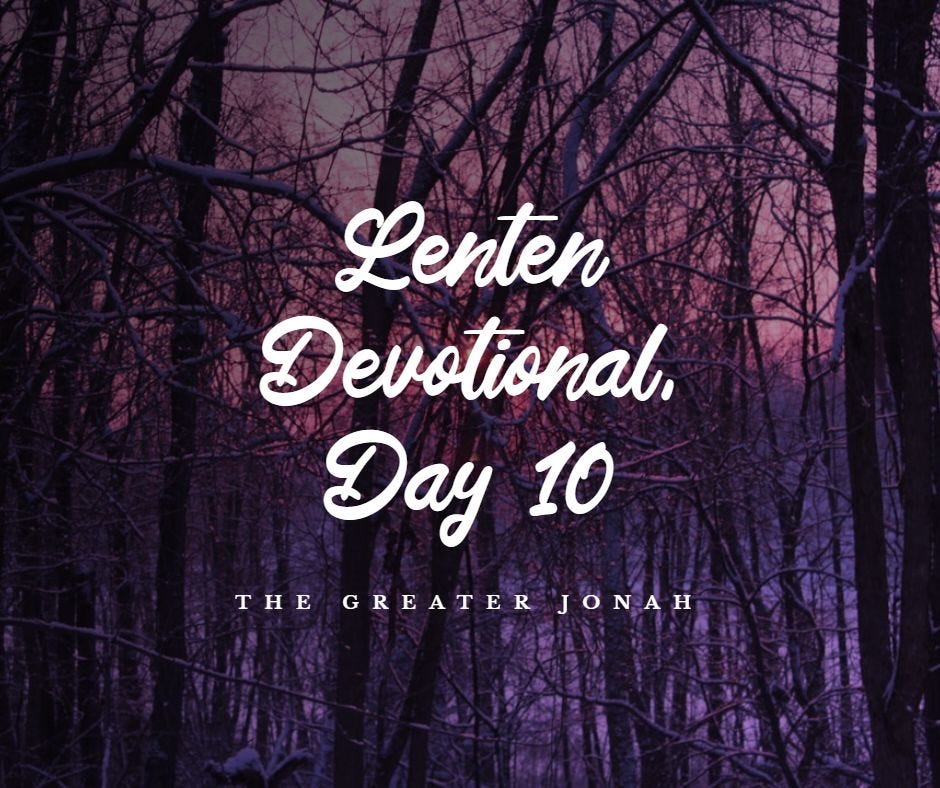Lenten Devotional (10), Universalism and Bourbon Coffee
The Greater Prophet
The story of Jonah is very familiar to our ears. These famous words have inspired thousands of poems and novels:
“And the Lord spake unto the fish, and it vomited out Jonah upon the dry land.”
Our famous prophet is brought through this journey of death in the belly of the beast and, through repentance, is spat out of the fish after three days. This parallels Jesus’ three days in death after the crucifixion (Matt. 12).
Unlike Jonah, our Lord was perfect, so that he did not need to repent. Still, it is fairly certain to say that Jesus went to Sheol during those three days of bodily death and proclaimed victory from death; or, we could say, he proclaimed victory from Sheol.
The parallels are remarkable. Jonah is swallowed up by Sheol; Jesus is swallowed up by Sheol. Jonah repents and finds life; Jesus prays right before death that his enemies would be forgiven and find life; Jonah spends three days in Sheol; Jesus spends three days in Sheol. Jonah proclaims that salvation is of the Lord in Sheol; Jesus proclaims that salvation is of the Lord in Sheol; Jonah is spat out of Sheol after three days; Jesus is spat out of Sheol (grave) after three days.
The stories of the prophets always remind us in these remaining thirty-one days that Jesus is the greater prophet–Jesus is the greater Jonah. Death cannot keep him in the grave.
Prayer: O merciful God, you give us life when we turn to you. Like Jonah, may we seek your temple in our despair and our delight. Where can we go from your Spirit? Even in Sheol, you are there to speak life to our weary hearts. Blessed are you, Jesus, the one whom even Sheol could not hold. Amen.
~~~
Notations:
*Frame notes that theologians have attempted to find a central theme in the Bible. Moltmann believed it was hope. Gutierez believed it was liberation. Brunner thought it was a personal encounter. John Frame finds these insufficient and argues that the Bible portrays the centrality of Divine Lordship (15).
Critics of Lordship oppose it for two main reasons: a) It conveys power and authority and, therefore, dominance. We need a more egalitarian theme that sustains the redemptive shifts in the Bible. These are the liberal opponents of Lordship.
b) Conversely, scholars like Darry Hart oppose it because Lordship assumes power over temporal affairs (17). Hart wishes to preserve a dichotomy between how Christ rules now and the world to come. This may be the conservative critique of Lordship rooted in a two-kingdom theology.
I subscribe to Frame’s thesis and affirm that “God’s Lordship confronts and opposes autonomy from the outset” (17). God does rule over this world as King, and he rules over the temporal nature of the State and family and the eternal nature of the Church.
*In the essay, “Will All Be Saved?” written by Gerald McDermott (Themelios), he argues that if everyone will eventually be saved, the stamina for evangelism will fade. Further, that universalism is an attempt to deal with the question of theodicy. In many ways, universalism is just another variation of Open Theism, re-creating a God that avoids the wrath motif of the Old and New Testaments.
*All a writer needs is good coffee. I have had the fortune of tasting coffee from over 30 states. When I did not have the privilege of visiting those states, kind parishioners brought me some.
I am not sure I was prepared to try this gem from Maine. It was expensive, but these beans sabbathed in bourbon barrels for 3-6 months. Even my wife, who drinks her coffee with a bit of sugar, said she could probably have this black with a little cream.
The smell of warm bourbon, while I am pouring over, is sublime, and the whole experience was worth the price.
Hymn of the Day: Rock of Ages



